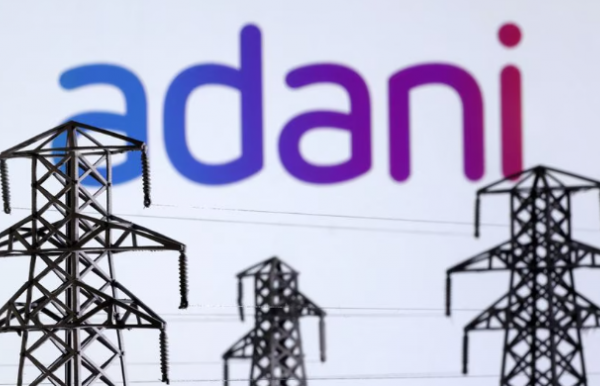Adani Group says Bangladesh’s $500 million debt from Godda power plant ‘unsustainable’
- Update Time : Monday, September 9, 2024

TDS Desk:
India’s Adani Group has warned Bangladesh’s new government that its overdue payments for coal power supply from the controversial Godda plant have become “unsustainable”.
Speaking to Financial Times, the Adani Power in a statement said, “We are in constant dialogue with the Bangladesh government and have appraised them of this unsustainable situation where we are meeting not just our supply commitment but also [commitments] to our lenders and suppliers in spite of rising receivables.”
It, however, added that the conglomerate would “continue to supply reliable and competitively priced power from our Godda facility to Bangladesh, despite mounting dues”.
Billionaire Gautam Adani’s power generating unit has raked up unpaid dues of as much as $800 million from Bangladesh, where weeks of violent protests left hundreds dead and forced out the previous administration last month.
Speaking to Bloomberg news, Governor Ahsan H Mansur said, “If we don’t pay them, they will stop providing electricity.”
Meanwhile, Muhammad Fouzul Kabir Khan, Yunus’s top energy adviser, told the FT that Bangladesh is late on paying $492mn to Adani, to whom it owes as much as $800mn in total.
He said the interim government had approached lenders including the World Bank for billions of dollars in loans to help stabilise its finances. “Since joining [the government], we’ve been firefighting,” Khan said.
Gautam Adani shared a post on X in 2022 on the commissioning of the Godda power project and lauding the then prime minister Sheikh Hasina’s vision for Bangladesh. The plant started commercial operations in April last year.
An unsustainable deal?
With Bangladesh buying some of its power from India’s electricity exchange market at almost half the price of Adani coal power plant, the power deal with the Indian power giant has come into question that had a significant role in increasing Bangladesh’s power price by as much as 8%.
According to official data, Bangladesh bought Adani’s power for Tk14.02 per kilowatt-hour (or a unit) in 2023. Bangladesh bought another 1,100MW power from India’s electricity exchange market at Tk7.83 per unit.
Adani’s alone supplies around one-tenth of Bangladesh’s total power need. And its impact can be seen in the average power generation cost in the country.
Whereas average generation cost was Tk5.91 per unit five years back, and Tk8.84 in 2021-22, it has become Tk11.03 per unit now. However, Adani’s power is not the only factor in such an increase. There are several other unfavourable power contracts that have contributed to this situation.
Even before commercial supply began in April last year, power officials had raised concerns over the Adani plant’s coal pricing formula and requested a revision of the power purchase agreement.
In a letter to Adani Power in December 2022, the Power Division mentioned that Adani quoted $400 per tonne of coal, which was $245 per tonne for Payra power plant in Bangladesh.
But their concerns were not considered.
“What is agreed will remain as it is. Electricity prices will increase and decrease, along with coal’s price on global markets,” the then state minister for energy Nasrul Hamid told the media in February 2023.
The rationale of the power purchase agreement (PPA) with Adani was questioned soon after it was signed in Dhaka in November 2017, when the country already had higher installed capacity than actual generation.
By the time Adani power started flowing into Bangladesh, the installed capacity rose to 24,911MW in June 2023, with peak generation reaching 15,648MW in that fiscal year.
Experts also found the then government’s projection of future generation electricity was based on an unrealistic estimate of demand growth.
The Centre for Policy Dialogue (CPD) found the government’s projection – energy demand to cross 50,000MW in 2041 – “overly ambitious” and based on unrealistic demand growth in the integrated master plan drafted by the energy ministry in June 2022.
Already, there were a number of coal-based power plants either under construction or planned. With Bangladesh’s gas reserves dwindling, the government was opting for coal-based and fuel oil-run private power plants, leading to higher generation cost and increased spending in subsidy and capacity charge.
By the time electricity supply started from Adani’s first unit in April last year, the government was being increasingly burdened with unpaid bills of local power and gas producers due to both cash crunch and dollar crisis.
On 29 May, India’s Adani Group Director Pranav Adani met the then finance minister Abul Hassan Mahmood Ali requesting quick clearance of outstanding electricity bills amounting to around $700 million.
Experts, however, consistently raised flags about the deal.
Energy expert Prof M Tamim said the Adani power deal requires scrutiny.
“I don’t know what is inside the agreement. If there is any serious lack of fairness and equity, it definitely calls for a review.”
Usually, such purchase agreements contain clause that allows renegotiation in case of any disputes or withdrawal by any of the parties in case of any violation of the contract, said Prof Tamim, a teacher of Petroleum and Mineral Resources Engineering, Buet, who was a special assistant to the 2007-08 caretaker government chief on energy affairs.
“It depends on the type of the contract. All such deals are expected to be balanced, protecting the investors as well as being win-win for all parties,” he said.
M Shamsul Alam, vice president of the Consumers Association of Bangladesh, said the deal must be reviewed as it was unsolicited and favoured only the investor undermining the national interest.
“Even it can be scrapped altogether. If the government does not do it, people can go to court seeking to scrap the Adani power deal,” he said, citing instances of such legal steps against Niko and some others.
As there was no bidding, the investor maximised their gains and got the deal signed absolutely in their favour, the energy analyst said. When procurement costs rise, the single buyer, the state-owned PDB, passes it on to consumers and makes them pay a high price for electricity. “Here the government itself appears to be profit-monger,” he pointed out.














